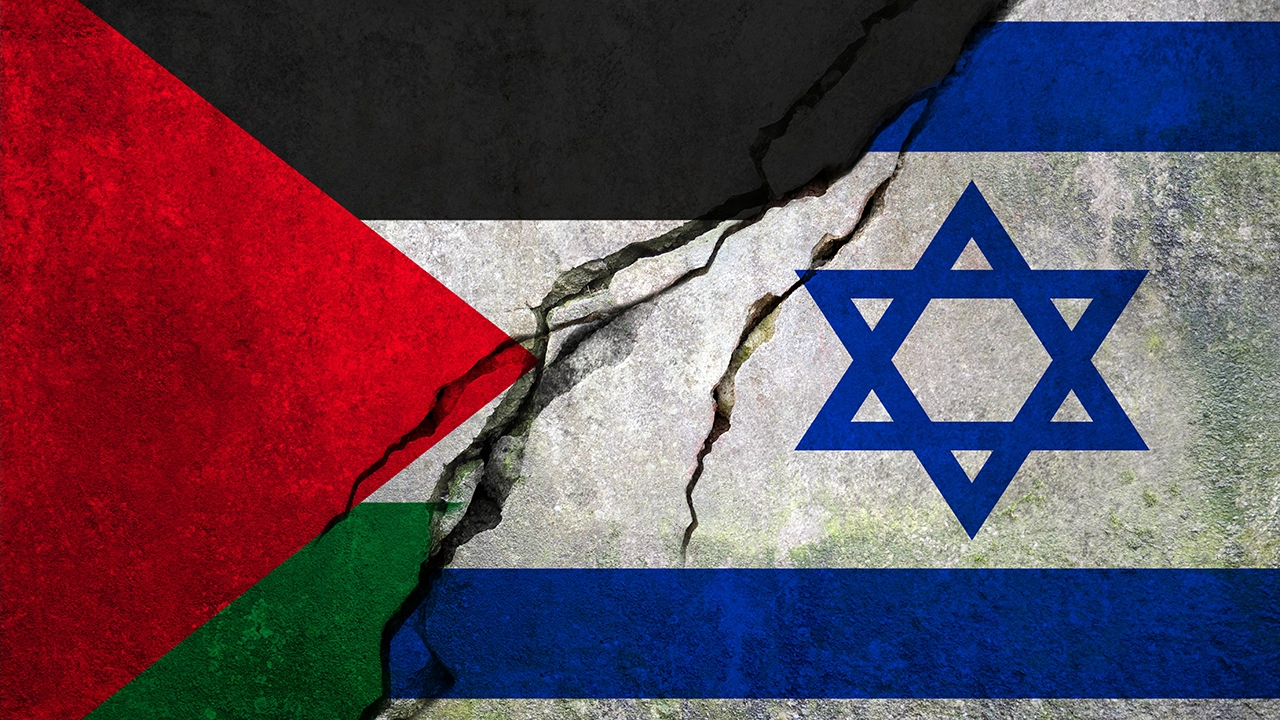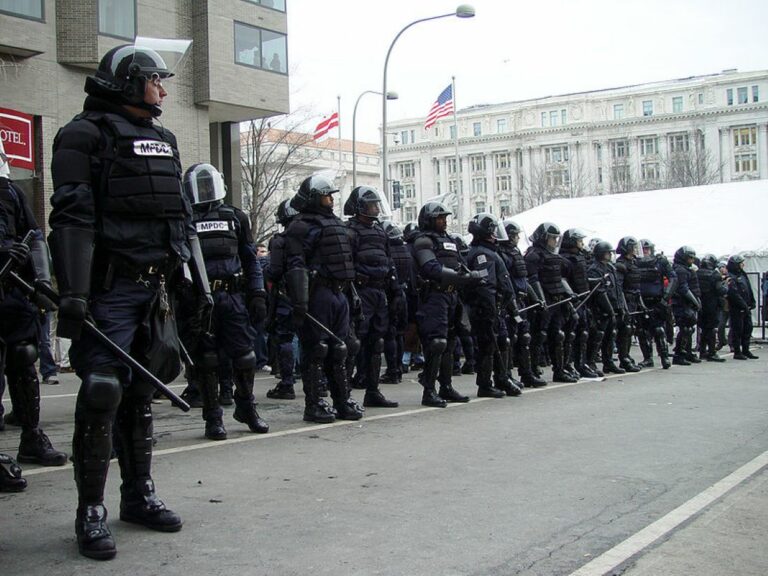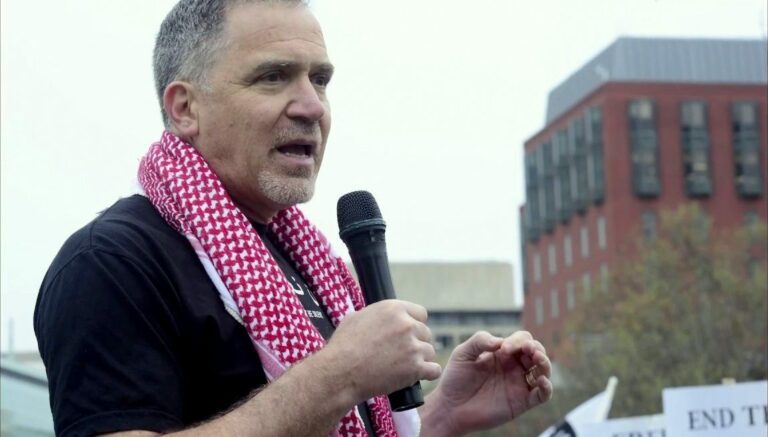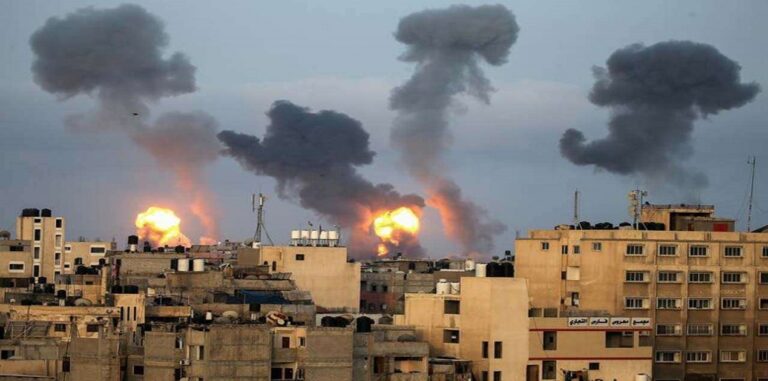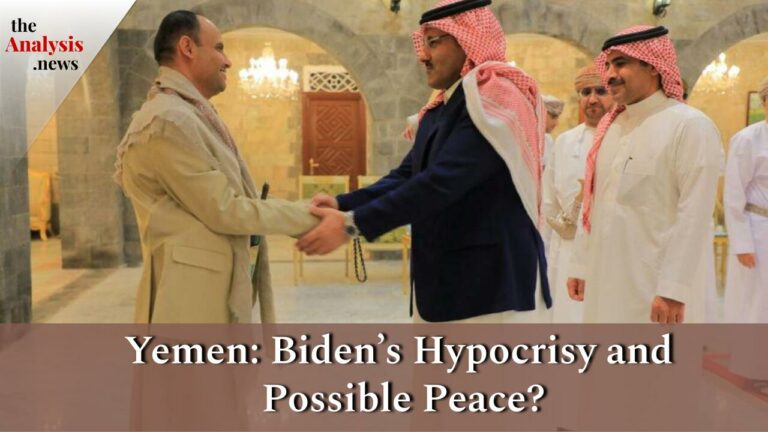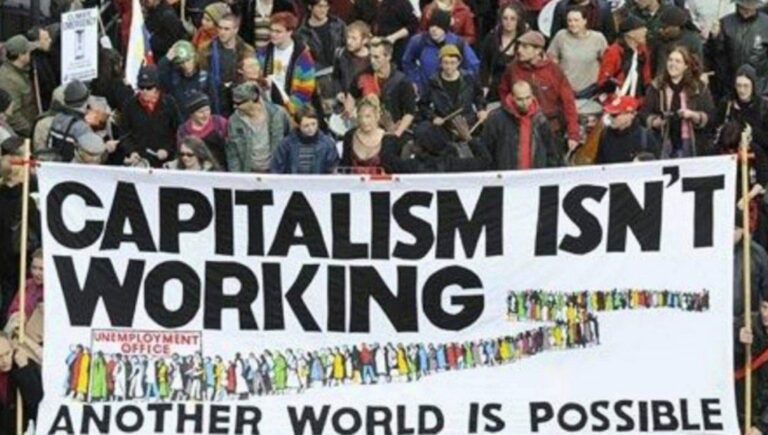The Survival of the Palestinian People is Itself a Form of Resistance – Rania Masri pt 3/3
This is an episode of Reality Asserts Itself, produced September 25, 2013. In this last segment of Reality Asserts Itself with Rania Masri, Paul Jay asks why she considers Israel the “enemy” state; the one-state solution; and the possibility of a new political leadership amongst the Palestinians.
PAUL JAY, SENIOR EDITOR, TRNN: Welcome back to The Real News Network. I’m Paul Jay, and this is Reality Asserts Itself. We’re continuing our series of interviews with Rania Masri. Rania is a outspoken critic of the Obama administration’s push for military intervention in Syria. She teaches environmental science at the University of Balamand in Lebanon. And you can see more of her biography underneath the video player on our page.
But we are running out of time, so we’re going to get right to the next part of the interview.
Thanks for joining us again.
RANIA MASRI, HUMAN RIGHTS ACTIVIST, ENVIRONMENTAL SCIENTIST: Thank you.
JAY: So earlier in the interview you said the only state that you would use the word enemy for is Israel. You mean the only state in the world.
MASRI: Yes. Not that I consider all other states to be friends and comrades, mind you.
JAY: Okay, but you reserve the word enemy for the Israeli state.
MASRI: Yes.
JAY: Why?
MASRI: It is a foreign entity. It is a state that has been founded upon ethnic cleansing and genocide and apartheid. And it is quite personal, because, you know, they’ve done that on an area that I consider to be part of my nation and a people that I consider to be my own.
JAY: I mean, there are other places in the world. You can find states that have occupied other states.
MASRI: Yes. We can look at the United States. That was example of ethnic cleansing and genocide to a much larger degree. We can look at Central America and South America, where we’ve had massive crimes of genocide and slavery and economic warfare and so much, I mean, so much. And when I grew up thinking that it was only us, only, you know, we the people of that particular region that had suffered, I actually felt more hope with that level of exceptionalism. But when I started reading Eduardo Galeano and reading others and discovered that we were no exception to horrors, that actually gave me a great deal of sadness and despair. And misery does not love company when it comes to oppression.
JAY: So then why do you reserve that word just for the Israeli state? And let me tell you why I think it matters. Even if purely from a strategic point of view, do you think it’s possible for Palestinians to achieve their rights if there isn’t some kind of split in the Israeli population?
MASRI: You mean a two-state solution?
JAY: Whether it’s two states, one state, whatever the Palestinians decide is in their interest–and it seems to me either of the two choices are up to the Palestinians to make. I know there’s a growing amount of support for a single-state solution. If they decide it should be one person, one vote, they have a right to say that. If they decide it’s two states, it’s their business as well.
But all that being said, if the Israelis themselves feel besieged, if they feel this language that there’s something more than exceptional about their occupation, then it starts to feel like there’s a kind of tribal, ethnic, racial character to the critique, which plays right into the hands of Zionist propaganda, and instead of, you know, dividing the Israelis–and there’s been times when there’s been more of a peace movement. There are certainly always a certain number of Jewish-Israeli activists that are part of the solidarity movement with Palestinians. But the more you get this kind of language, the more it consolidates this feeling that, oh, we’re besieged, so we all better hang together and support this Jewish state.
MASRI: Yes, I hear you. And I think the Israelis have been very, very successful in building up this kind of victimized mentality.
But for me the Israeli state, so long as it is and apartheid, occupying state–and I include both those terms, occupation and apartheid; so neither one in and of itself needs to go; both of them need to go–then it will remain an enemy state. Now, that does not mean that we cannot make peace with Israelis.
JAY: Well, just to be clear, what I’m saying–I’m not saying Palestinians shouldn’t, you know, have every right to call this an enemy state. I’m only saying when you say it’s the only enemy state on the planet, that’s a different issue. For example, there wouldn’t be an Israeli state if there wasn’t an American state there to make sure it was there.
MASRI: True. Very much so. Very much so. And I’m very well aware of the numerous crimes of colonial powers, be they the Americans, the British, the Dutch, the French, the Italians, I mean, very well aware of them.
JAY: But none of what Israel does is outside the American umbrella.
MASRI: True. True. And none of what they have done have been exceptional in human history. You know, it’s been quite old and, you know, it’s–none of it has been exceptional. But it’s personal. It’s deep deeply, deeply personal. And so that’s why there’s that term that I reserve, which is the apartheid state of Israel remains an enemy state, just because it’s as–closest thing to a personal struggle politically that we continue to face as a people.
Now, I believe very strongly that the only solution left is a one-state solution, a one-state solution where Jewish, Muslim, and Christian live side-by-side, where religion goes back to its place as being in the private sector and not being in the institutional sector. Palestinians and Israelis live side-by-side. There is space enough within the current state of Israel to actually house Palestinian refugees who have been expelled from their homes, as Salman Abu-Sitta, an expert on refugees, has shown.
And I believe over time that the Israelis will recognize what the white South Africans have recognized, that the only path to true peace is one of a full democracy and not a racist-based kind of state. Very much so I believe in that. I don’t subscribe to the idea that we should expel all Israelis into the sea or expel the Zionists into the sea. No, I don’t believe that ethically. I don’t believe that strategically. And there are Israelis that I consider to be comrades, namely, Ilan Pappé, for example, who is a marvelous historian and a marvelous individual. And I would consider him a comrade, yes. You know, even though he is an Israeli, I would consider him a comrade, as well as there are numerous Palestinians, Lebanese, Syrians, Iraqis–I could go on and on and on–that I consider them to be strict opposition, both in terms of their political and their economic platforms.
JAY: I was in Ramallah in the West Bank a couple of years ago, and almost everyone I talked to in the occupied territories, and pretty well everyone I talked to in Israel as well, all thought the two-state solution was never going to happen. Most–on the Palestinian side, most people don’t want it. They realize that if there’s going to be a second state, it’s going to be a bantustan thing with no real powers and kind of just be under a different–sort of a neocolonial kind of occupation instead of direct. But where is that voice? We don’t hear a very loud organized voice for a, you know, one person, one vote, single state kind of solution.
MASRI: I think it’s been increasing. I mean, that concept first arose in the ’70s, actually. Yasser Arafat actually proposed it back in the ’70s. And then he dropped it. So it was first born then.
And over the past 5 to 10 years, I would argue that we have seen a larger and larger group of both Palestinians and Israelis who are calling for a one-state solution. And I think if we give it enough time, we will see it grow, because it is the only option. We have a million and a half Palestinians within the state of Israeli with Israeli citizenship who are going nowhere, and they will continue to have children, and their demographics will continue [crosstalk]
JAY: Well, maybe they’re going nowhere. I mean, if you listen to–.
MASRI: Unless they enforce forced transfer and forced expulsion and–. You know.
JAY: Well, if you listen to Lieberman, who was the foreign minister, and you look at his plan for the two-state solution, you know, it winds up like the map goes like this to try to put as many Palestinian-Israeli villages into the West Bank and then keep, you know, the settlers and bring them back into Israel. So the idea of a kind of ethnic cleansing isn’t out of the question.
MASRI: No, it’s not. And it’s been ongoing. It’s been ongoing. If we look at the Palestinian [‘bEduz] within the state of Israel and the forced expulsions and the ethnic cleansing, but they continue to endure. The ethnic cleansing against Palestinians did not stop in ’47, ’48. It has been ongoing. And in many senses, you know, we do see that kind of occupation extend itself beyond the so-called occupied territories into the state of Israel. So, yes, that has been ongoing.
JAY: But let me get back to my first point, then. And it’s not about arguing semantics, ’cause–I mean, I don’t–if you want to call it the only enemy state or not, I don’t care, really. But it’s more a kind of a bigger strategic problem. And this goes back to some of the terrorist attacks that took place, like the blowing up cafés in Israel. And I think most Palestinians, and certainly Palestinians I’ve talked to, their end here, think of that as having been a very counterproductive strategy, because those–if nothing else, forget moral and ethical considerations, it helped to consolidate a very right-wing position in Israel.
MASRI: I agree.
JAY: But you still–I don’t–I mean, when I was over there recently–and I know it’s hard, because–and I have to say I was–as much as I know about the situation, I was still taken aback at the level of racism in Israel, how easily people will say the most overtly anti-Palestinian, racist things that almost nowhere else in the world could people talk about another people that way so openly and get away with it. But that being said, for the interests of the Palestinians, doesn’t there have to be more of a discourse directed at Israelis that we don’t want to throw you in the sea, you are not, the enemy? ‘Cause–.
MASRI: I think they know that. Nobody’s been claiming that they want to throw Israelis into the sea. And actually, historically–.
JAY: Okay, forget that particular phrase. But–and listen, it’s very hard. When you’re an occupied people and you have suffered war crimes, it’s hard not to talk with tremendous anger. I understand that.
But, you know, even at the level of organized Palestinian politics, there just doesn’t seem to be that attempt to kind of win over at least some section of the Israelis.
MASRI: Well, I would argue that the first priority for organized Palestinian politics is to truly represent Palestinian aspirations. And when we look at Palestinian politics, be it the Palestinian Authority, Hamas, the whole range of them, they have failed in representing Palestinians, be they Palestinians within the state of Israel, be they Palestinians under occupation, or be they the millions of Palestinians in the diaspora. So our first obligation is to Palestinians themselves and to trying to get accurate–. Yeah, I’m with you,–
JAY: I’m not arguing it from any other point.
MASRI: –but in terms of–first we build that Palestinian representation.
JAY: Okay. So where is that? Because in terms of organized Palestinian politics, you know, the sort of whether it’s Fatah or whether it’s Hamas, most of the Palestinians are very cynical about all of them, and more or the less the way Americans are pretty cynical about most of their own politicians. There’s been a growing civil rights movement. There’s been a growing kind of peaceful protest movement demanding rights. Where is that at?
MASRI: It’s hard to feel hopeful. I have to be honest. I mean, we’re right now commemorating 20 years of Oslo. And in 20 years of Oslo, we have seen increased settlements, increased ethnic cleansing, increased detentions, increased imprisonment, increased killings, and an increased Palestinian police force protecting Israelis from Palestinians, which, of course, was not the objective of Oslo. So we have gone back a great deal in the past 20 years. The struggle is very, very difficult, and it is hard to find hope. The only aspect of hope that I find is the fact that Palestinians are still surviving, and their survival becomes the greatest form of resistance that they can do. And then we’ll take it forward.
JAY: Now, I don’t think there’s any question in this story of Israel-Palestine, the villain in the peace is the Israeli state and Zionism. But how do you assess the role of the Arab regimes, who, you know, love to love this as an issue? Like, take Lebanon as an example. I mean, the situation of Palestinians in Lebanese refugee camps is terrible.
MASRI: Well, I mean, the kindest word I can say about Arab regimes is they have been stupid, criminal, more accurately treasonous, and the Palestinians have suffered not only at the hands of Israelis and at the hands of all those who have supported the Israelis directly, but also at the hands of Arab regimes, be they in their failure to stand with Palestinians in solidarity, not in charity, but in recognized solidarity, or be there in their direct complicity with Israeli war crimes. So, yes, Arab regimes are guilty, most definitely. And the Lebanese government is no exception.
JAY: And has the Arab Spring, the uprisings in the various countries and all that, has it changed the Israeli-Palestinian dynamic at all?
MASRI: Not outside, no, I would argue, no. In Egypt not at all. In Lebanon not at all.
JAY: Well, now in Egypt it perhaps might even be worse than it was earlier in the revolution.
MASRI: Now it is worse. Now it is worse. But even under Morsi it was worse. You know, under Sisi it’s definitely worse. But no.
JAY: Yeah, apparently they’re closing down the whole tunnel system into Gaza. The siege of Gaza’s going to be much worse now.
MASRI: Mubarak began it, Morsi continued it, and Sisi is exemplifying it. They’re really–it hasn’t been a new policy. It’s just been a building of the previous policy rather than even a pause or a step back.
So no, what I look at it, how has the Arab uprising, so to speak, helped the Palestinians? It hasn’t. How has it helped them within the land of Palestine, that’s up for question.
JAY: There seems to be a desperate need–and it’s not just true of the Middle East. I think you could say this globally. But because of the level of struggle is so intense in the Middle East, for some new kind of political leadership–and you kind of see signs of it with some of the young activists, some of the people involved in the boycott movement, and some of the civil rights movements that’s been happening in Palestine, and you see, you know, pieces of it sort of. But no kind of thing has really emerged with a cohesive political vision that people can fight around.
MASRI: I agree. And we’re all romanticizing this idea of a leader that will step in and be the hero and we’ll follow him or her. And I don’t think that’s going to happen. And I think we need to start examining ourselves and need to be looking at how each of us individually can be building solidarity within his or her own community and then be expanding that forward, rather than be waiting to be passive followers of a hero.
JAY: But how will this–there is a need for this political leadership. I think everybody recognizes it. I wasn’t thinking great leader. But there needs something.
MASRI: Well, the ideology we have–I mean, we believe in a one-state solution, at least, you know, I believe in a one-state solution supported by numerous other Palestinians and others. So we know where we want to go. We know we want to see an end to apartheid. We know we want to see an end to occupation. We know at least a lot of us recognize the economic oppression. So it’s not simply the aspect of we want to remove the Israelis and replace them with, you know, a Palestinian feudal lord. We want to see liberation in all its many forms, economic and political and military. We have the vision. The question is: how do we build the road to that vision? How do we implement it? Many of us consider BDS to be one pathway, not the only pathway. And this is critical.
JAY: Boycott, divestment–.
MASRI: Boycott, divestment, sanctions, to be one pathway, to be focusing on culture, athletic, diplomatic.
JAY: But that’s still primarily focused externally. It doesn’t solve a domestic political problem.
MASRI: Yes. Yes. Yes. I think we need to be looking at decentralized struggles. Given the centralized struggle itself being so problematic because of the leadership, how do we decentralize the struggle and build local communities and work our way forward?
JAY: I mean, why–I mean, there will be Palestinian elections. There doesn’t–has there been an attempt? I’m not aware of it. Has there been an attempted to form another force that can run in the elections?
MASRI: Not that I’m aware of, not that I’m aware of. And there’s sometimes pockets of hope that arise. But we’re still dealing with political parties that are still fighting over their piece of the pie rather than a popular leadership that recognizes the whole pie needs to be changed.
JAY: Okay. To be continued. Thanks very much.
MASRI: My pleasure. Thank you.
JAY: And thank you for joining us on The Real News Network. And this is to be continued. Rania’s running off to another speaking event, but we’ll either continue this while she’s in Beirut or we’ll find some way when she comes back.
As always on Reality Asserts Itself, if you have some questions that you’d like to ask Rania, email us and we will send them to her. And we can either do it by webcam from Beirut or–I mean, that will probably be what we do. And we’ll do a session just dealing with viewer questions. So thanks again.
MASRI: Thank you again.
JAY: And thank you again for joining us on Reality Asserts Itself on The Real News.
“Rania Masri is a human rights advocate and environmental scientist. Born in Lebanon, she is the coordinator of the Iraq Action Coalition and served as the Arab Women’s Solidarity Association’s representative to the United Nations. She’s the director of the Southern Peace Research and Education Center at the Institute for Southern Studies in Durham, North Carolina. A dynamic speaker, she’s in great demand all over the country. She’s also a producer of a new documentary entitled About Baghdad.“
